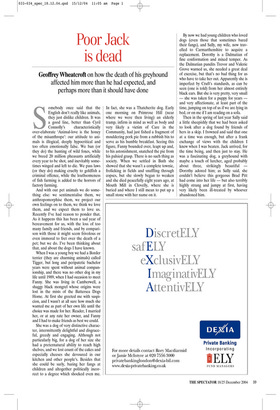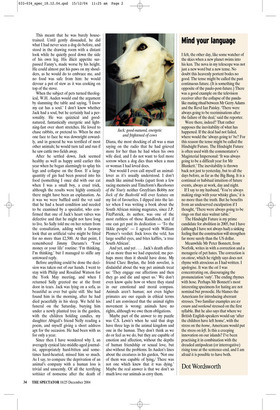Poor Jack is dead
Geoffrey Wheatcroft on how the death of his greyhound affected him more than he had expected, and perhaps more than it should have done Somebody once said that the English don’t really like animals, they just dislike children. It was a good line, better than Cyril Connolly’s characteristically over-elaborate ‘Animal-love is the honey of the misanthrope’: our attitude to animals is illogical, deeply hypocritical and too often emotionally false. We ban (or they do) the hunting of wild foxes, while we breed 20 million pheasants artificially every year to be shot, and inevitably sometimes winged and left to die. We pass laws (or they do) making cruelty to goldfish a criminal offence, while the loathsomeness of fish farming is added to the horrors of factory farming.
And with our pet animals we do something else: we sentimentalise them, we anthropomorphise them, we project our own feelings on to them, we think we love them, and we expect them to love us. Recently I’ve had reason to ponder that. As it happens this has been a sad year of bereavement for us, with the loss of too many family and friends, and by comparison with those it might seem frivolous or even immoral to fret over the death of a pet; but we do. I’ve been thinking about that, and about the dogs I have known.
When I was a young boy we had a Border terrier (they are charming animals) called Tigger, but long and peripatetic bachelor years were spent without animal companionship, and there was no other dog in my life until 1989, when I had occasion to meet Fanny. She was living in Camberwell, a shaggy black mongrel whose origins were lost in the mists of the Battersea Dogs Home. At first she greeted me with suspicion, and I wasn’t at all sure how much she wanted me as part of her own life until the choice was made for her. Reader, I married her, or at any rate her owner, and Fanny and I had to make friends as best we could.
She was a dog of very distinctive character, intermittently delightful and disgraceful, greedy and engaging. Although not particularly big, for a dog of her size she had a preternatural ability to reach high shelves, and we lost count of the cakes and especially cheeses she devoured in our kitchen and other people’s. Besides that she could be surly, baring her fangs at children and altogether politically incorrect to a degree which shocked even me. In fact, she was a Thatcherite dog. Early one morning on Primrose Hill (near where we were then living) an elderly tramp, infirm in mind as well as body and very likely a victim of Care in the Community, had just fished a fragment of mouldering pork pie from a rubbish bin to serve as his humble breakfast. Seeing this figure, Fanny bounded over, leapt up and, to his astonishment, snatched the pie from his palsied grasp. There is no such thing as society. When we settled in Bath she showed that she wasn’t a complete townie, frolicking in fields and snuffling through copses, but she slowly began to weaken and she died peacefully eight years ago, at Mouth Mill in Clovelly, where she is buried and where I still mean to put up a small stone with her name on it. By now we had young children who loved dogs (even those that sometimes bared their fangs), and Sally, my wife, now travelled to Carmarthenshire to acquire a replacement. Dorothy is a Dalmatian of fine conformation and mixed temper. As the Dalmatian pundits Trevor and Valerie Grove warned us, she needed a great deal of exercise, but that’s no bad thing for us who have to take her out. Apparently she is imperfect by Cruft’s standards, as can be seen (one is told) from her almost entirely black ears. But she is very pretty, very small — she was taken for a puppy for years and very affectionate, at least part of the time, jumping on top of us if we are lying in bed, or on me if I am reading on a sofa.
Then in the spring of last year Sally said a little sheepishly that we had been asked to look after a dog found by friends of hers in a skip. I frowned and said that one at a time was enough, but after a frank exchange of views with the children I knew when I was beaten. Jack arrived, for the time being, and then just to stay. He was a fascinating dog, a greyhound with maybe a touch of lurcher, aged probably about three, strikingly beautiful Dorothy adored him; as Sally said, she couldn’t believe this gorgeous Brad Pitt had come into her life — but also terribly highly strung and jumpy at first, having very likely been ill-treated by whoever abandoned him. This meant that he was barely housetrained. Until gently dissuaded, he did what I had never seen a dog do before, and stood in the drawing room with a distant look while he quietly peed down the side of his own leg. His illicit appetite surpassed Fanny’s, made worse by his height. He could almost put his paws on my shoulders, as he would do to embrace me, and no food was safe from him: he would devour a pot of stew as it was cooking on top of the stove.
When the subject of pets turned theological, W.H. Auden would end the argument by slamming the table and saying, ‘I know my cat has a soul.’ I don’t know whether Jack had a soul, but he certainly had a personality. He was quizzical and goodnatured, fantastically energetic and lightning-fast over short stretches. He loved to chase rabbits, or pretend to. When he met one face to face he was downright cowardly, and in general he was terrified of most other animals; he would turn tail and run if he saw cattle two fields away.
After he settled down, Jack seemed healthy as well as happy until earlier this year when he began alarmingly to splay his legs and collapse on the floor. If a large quantity of gin had been poured into his food (something I once did with our cat when I was a small boy, a cruel trick, although the results were highly comical) there might have been an explanation. As it was we were baffled until the vet said that he had a heart condition and needed to be examined by a specialist, who confirmed that one of Jack’s heart valves was defective and that he might not have long to live. So Sally told me on her return from the consultation, adding with a faraway look that an artificial valve might be fitted for no more than £2,500. At that point, I remembered Jimmy Durante’s ‘Your money or your life’ routine: ‘I’m thinking, I’m thinking,’ but I managed to stifle any untoward reply.
Before anything could be done the decision was taken out of our hands. I went to stay with Philip and Rosalind Watson for the York May meeting, and when I returned Sally greeted me at the front door in tears. Jack was lying on a sofa, as beautiful as ever but quite still. She had found him in the morning, after he had died peacefully in his sleep. We held his funeral on the Saturday, burying him under a newly planted tree in the garden, with the children holding candles, my daughter Abigail’s friend Nelly reading a poem, and myself giving a short address apt for the occasion. He had been with us for only a year.
Since then I have wondered why I, an averagely cynical late-middle-aged journalist, appropriately hard-bitten and sometimes hard-hearted, missed him so much. As I say, to compare the deprivation of an animal’s company with a human loss is trivial and unseemly. Of all the terrifying sottisier of nonsense after the death of Diana, the most shocking of all was a man saying on the radio that he had grieved more for her than he had when his own wife died, and I do not want to feel more sorrow when a dog dies than when a man or woman I had loved does.
Nor would I even call myself an animallover as it’s usually understood. I don’t much like animal books (apart from a few racing memoirs and Timeform’s Racehorses of the Year): neither Greyfriars Bobby nor Jock of the Bushveld will ever feature on my list of favourites. I dipped into the latter when I was writing a book about the South African mining magnates, since J.P. FitzPatrick, its author, was one of the most ruthless of those Randlords, and if one can get past its dedication — ‘To the likkle people’ — I agreed with William Plomer’s verdict: Jock loves the veld, has large soulful eyes, and bites kaffirs, ‘a true South African’.
And yet, and yet ... Jack’s death affected us more than we had expected; me perhaps more than it should have done. My friend Clare Boylan, the Irish novelist, is disdainful about the way pet animals treat us: ‘They engage our affections and then they go and die and upset us.’ We don’t even know quite how or where they stand in our emotional and moral compass. Animals aren’t human; not even higher primates are our equals in ethical terms and I am convinced that the animal rights movement is wrong: animals have no rights, although we owe them obligations.
Maybe part of the answer to my puzzle was C.S. Lewis’s when he said that dogs have three legs in the animal kingdom and one in the human. They don’t think as we do or feel as we do, but they are capable of emotion and affection, without the depths of human friendship or sexual love, but also without the problems. In Auden’s lines about the creatures in his garden, ‘Not one of them was capable of lying,/ There was not one which knew that it was dying.’ Maybe the real answer is that we don’t so much love our animals as envy them.


















































































 Previous page
Previous page